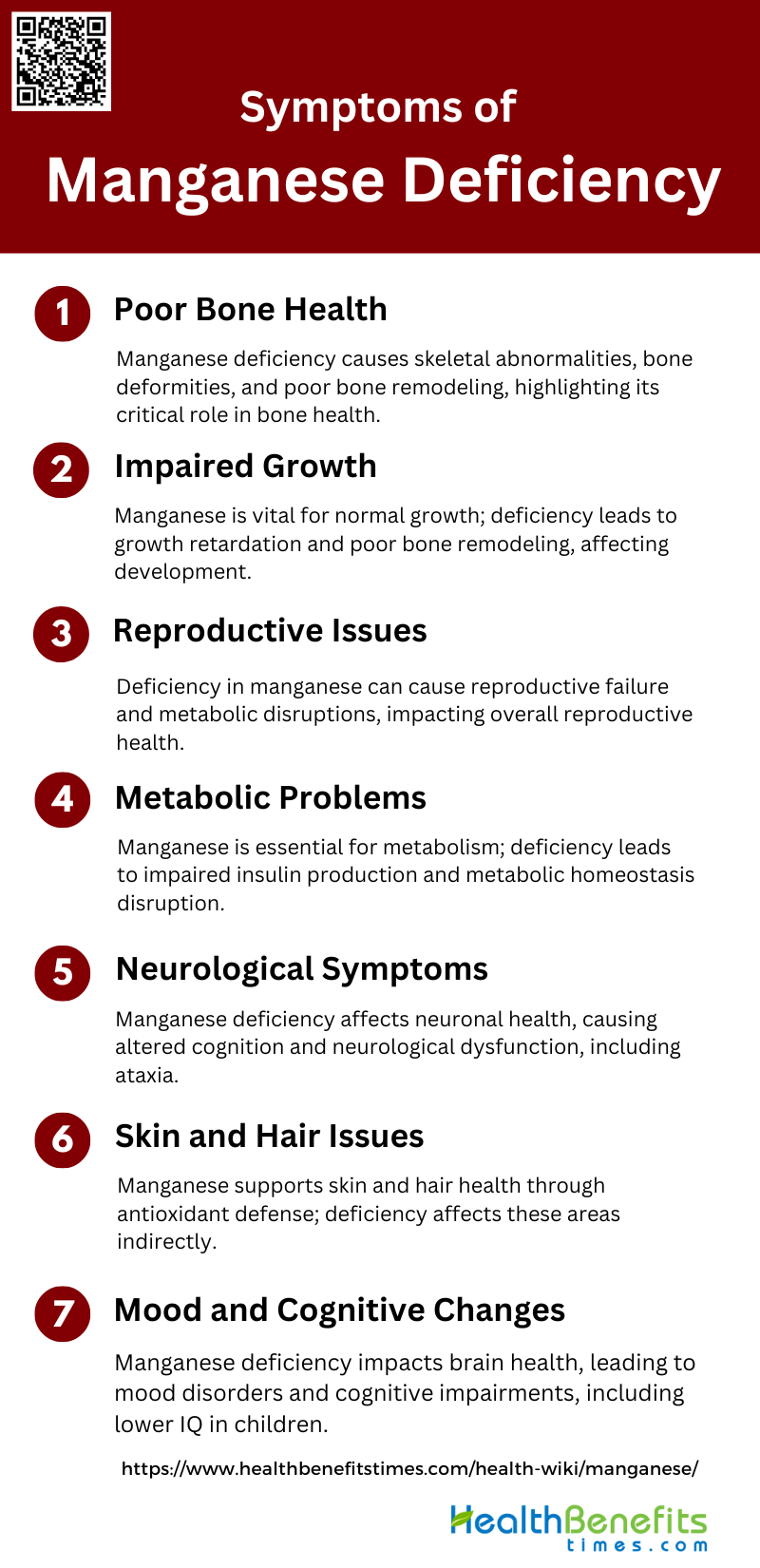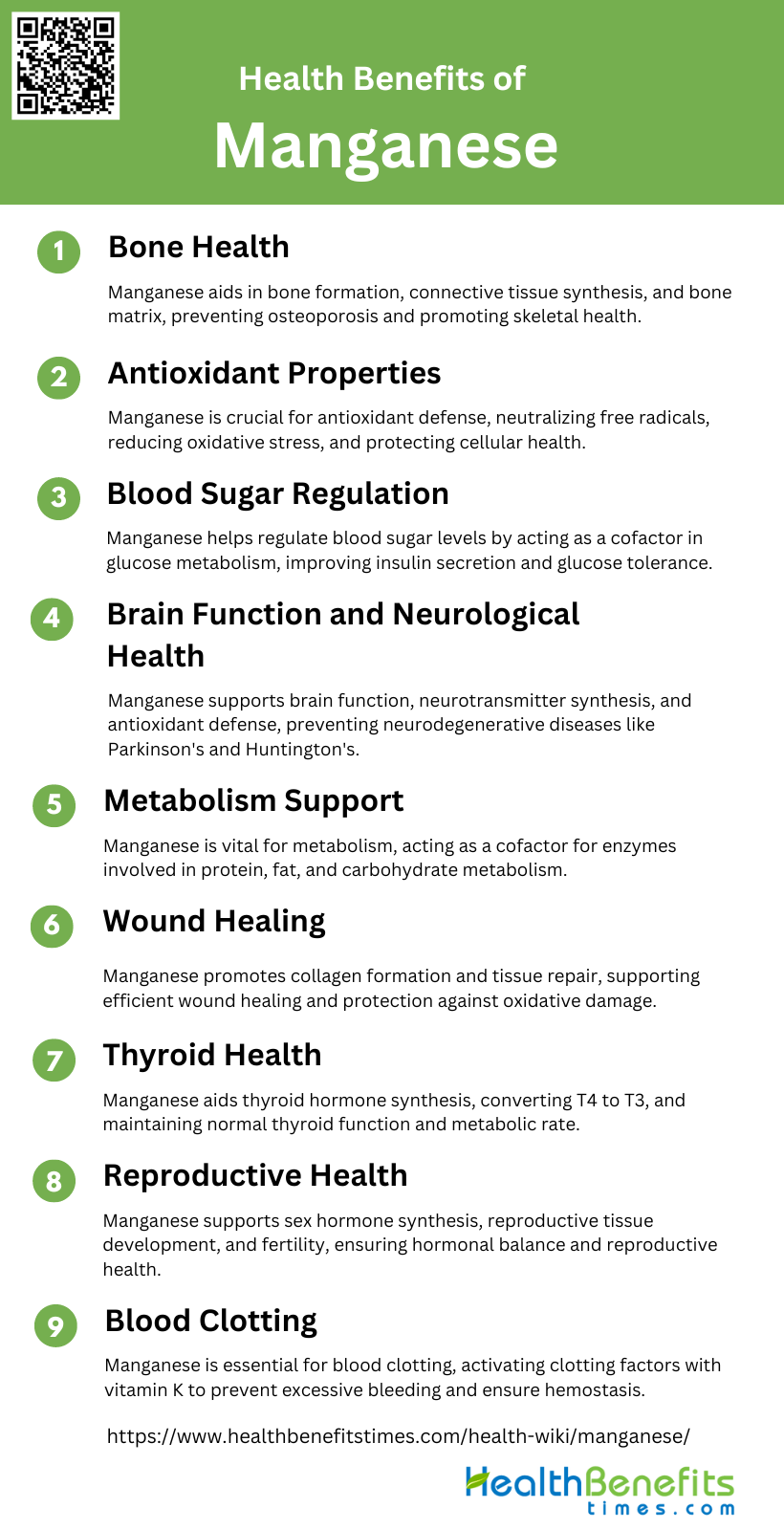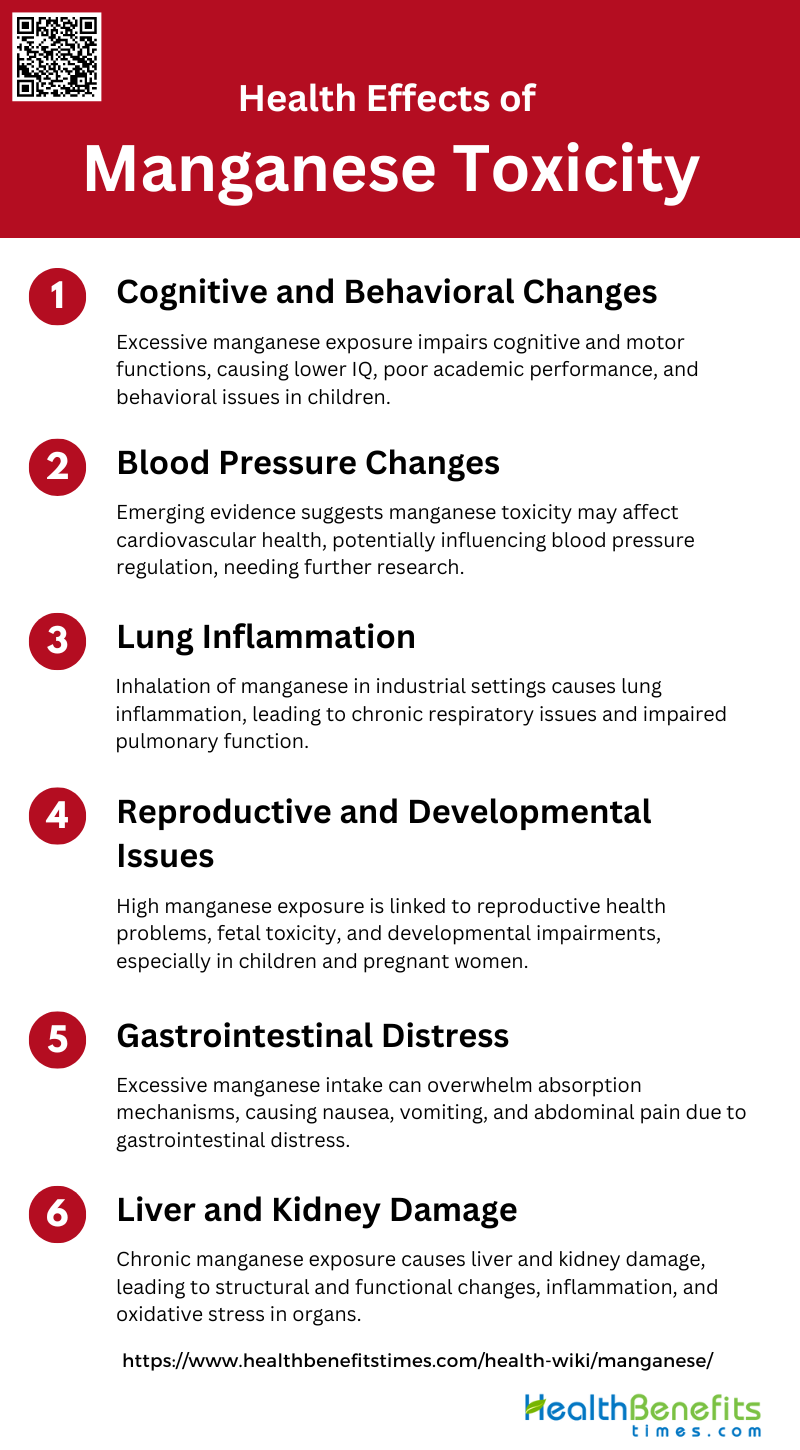Manganese (Mn) is an essential micronutrient that plays a critical role in various biological processes across different organisms. In plants Manganese acts as a cofactor for numerous metalloenzymes, facilitating key reactions such as redox reactions, phosphorylation, decarboxylation, and hydrolysis, which are vital for plant metabolism and growth. It is particularly important in the oxygen-evolving complex of photosystem II, where it catalyzes the water-splitting reaction essential for photosynthesis. In humans, Mn is necessary for the proper functioning of enzymes involved in antioxidant defense, energy metabolism, and immune function. However, both deficiency and excess of Mn can lead to significant health issues. Mn deficiency, although rare, can impair fetal development and lead to intrauterine growth retardation. On the other hand, excessive exposure to Mn, particularly in industrial settings, can result in neurotoxicity, manifesting as manganism, a condition with symptoms similar to Parkinson’s disease. Therefore, maintaining appropriate Mn levels is crucial for both plant and human health.
Sources of Manganese
It is an essential mineral found in various natural sources. It plays a crucial role in numerous biological processes and is commonly obtained through dietary intake. Here are some primary sources of manganese:
1. Food Sources
Manganese is an essential nutrient found in various plant foods, such as green tea, unrefined cereals, legumes, and vegetables. These foods are integral to metabolic processes, including bone formation and carbohydrate metabolism. The Japanese diet, rich in manganese sources, typically includes rice, cereals, and legumes, contributing significantly to daily manganese intake. Below are list of Food Sources of Manganese:
- Nuts and seeds: Especially hazelnuts, pecans, pumpkin seeds, and pine nuts.
- Whole grains: Particularly wheat germ, brown rice, and oatmeal.
- Legumes: Such as soybeans, kidney beans, chickpeas, and lentils.
- Leafy green vegetables: Spinach is a good source.
- Fruits: Pineapple is notably high in manganese.
- Tea: Particularly black tea.
- Shellfish: Mussels, oysters, and clams are excellent sources.
- Dark chocolate: Unsweetened baking chocolate is high in manganese
2. Mineral Sources
Manganese is also obtained from mineral sources, often used in dietary supplements and animal feeds. Studies have shown that different forms of manganese, such as manganese sulfate (MnSO4) and manganese chelate of glycine hydrate (Mn-Gly), can affect the bioavailability and tissue deposition of manganese in animals. For instance, Mn-Gly has been found to be more efficient in certain contexts compared to MnSO4. Below are list of Mineral sources of Maganese:
- Pyrolusite (MnO2): The most important manganese ore mineral.
- Psilomelane (BaMn9O16(OH)4): A complex manganese oxide.
- Rhodochrosite (MnCO3): A manganese carbonate mineral.
- Hausmannite (Mn3O4): A manganese oxide mineral.
3. Other Sources
Apart from food and mineral supplements, manganese exposure can occur through environmental sources, particularly in occupational settings. Inhalation of manganese dust in industrial areas can lead to elevated tissue levels and potential neurotoxic effects, a condition known as manganism. This highlights the importance of monitoring manganese levels in both dietary and environmental contexts to prevent toxicity. Below are list of Other Sources of Maganese:
- Drinking water: Contains small amounts of manganese.
- Dietary supplements: Manganese is often included in multivitamins and mineral supplements.
- Manganese nodules: Found on the ocean floor, these are potential future sources of manganese.
Symptoms of Manganese Deficiency
Manganese deficiency can also lead to a variety of health issues, affecting both physical and mental well-being. Common symptoms often include skeletal abnormalities, impaired growth, and reproductive issues. Below is a list of specific symptoms associated with manganese deficiency:
1. Poor Bone Health
Deficiency in manganese can lead to poor bone health, characterized by skeletal abnormalities and bone deformities. Experimental studies have shown that manganese-deficient animals exhibit pronounced skeletal abnormalities, including irreversible ataxia and bone deformities. In humans, manganese deficiency can result in poor bone remodeling and stunted growth, highlighting the critical role of manganese in maintaining bone health. Additionally, manganese is a cofactor for several enzymes involved in bone metabolism, further emphasizing its importance in bone health.
2. Impaired Growth
Studies have shown that manganese-deficient animals experience growth retardation and alterations in growth factor metabolism. In humans, manganese deficiency has been associated with stunted growth and poor bone remodeling. Furthermore, manganese is crucial for the regulation of numerous cellular processes, including cell growth and immune cell function, which are vital for normal development. The impact of manganese on growth is evident in both experimental animals and human populations, underscoring the importance of adequate manganese intake for proper growth and development.
3. Reproductive Issues
Research indicates that manganese deficiency can result in reproductive failure and changes in circulating HDL cholesterol and glucose levels, which are essential for reproductive health. Manganese is also involved in the regulation of various enzymes and cellular processes that are crucial for reproduction. The impact of manganese on reproductive health is evident in both experimental studies and human populations, highlighting the need for adequate manganese intake to prevent reproductive issues.
4. Metabolic Problems
Deficiency in manganese can lead to metabolic problems, such as impaired insulin production and alterations in lipoprotein metabolism. Manganese is a cofactor for several enzymes involved in energy production and antioxidant defense, further emphasizing its role in metabolism. Additionally, manganese deficiency can result in changes in circulating glucose levels, which are critical for maintaining metabolic homeostasis. The importance of manganese in metabolism is evident in both experimental studies and human populations.
5. Neurological Symptoms
Research has shown that manganese deficiency can result in altered neuronal physiology and cognition, leading to neurological dysfunction. Manganese is a cofactor for several enzymes involved in neuronal activities, and its deficiency can disrupt these processes, resulting in neurological symptoms. Additionally, manganese deficiency has been associated with ataxia and other neurological abnormalities in both experimental animals and humans. The impact of manganese on neurological health underscores the importance of adequate manganese intake.
6. Skin and Hair Issues
Although specific studies on skin and hair issues related to manganese deficiency are limited, manganese is known to play a role in various cellular processes, including those involved in skin and hair health. Manganese is a cofactor for enzymes involved in antioxidant defense, which is crucial for maintaining healthy skin and hair. Additionally, manganese deficiency can result in changes in circulating glucose levels, which can indirectly affect skin and hair health. The importance of manganese in maintaining healthy skin and hair is evident from its role in various cellular processes.
7. Mood and Cognitive Changes
Research has shown that alterations in body manganese status are associated with changes in neuronal physiology and cognition, leading to mood and cognitive changes. Manganese is a cofactor for several enzymes involved in neuronal activities, and its deficiency can disrupt these processes, resulting in mood and cognitive changes. Additionally, manganese deficiency has been associated with poor cognitive performance and lower IQ scores in children exposed to low levels of manganese. The impact of manganese on mood and cognitive health underscores the importance of adequate manganese intake.
Health Benefits of Manganese
Manganese is an essential trace mineral that plays a crucial role in various bodily functions, including bone formation, blood clotting, and reducing inflammation. It also acts as an antioxidant, protecting cells from damage caused by free radicals. Below is a list of specific health benefits associated with manganese:
1. Bone Health
Manganese is crucial for proper bone formation and maintenance. It aids in the synthesis of connective tissue and bone matrix, which are essential for bone strength and structure. Deficiency in manganese can lead to poor bone remodeling and stunted growth, highlighting its importance in skeletal health. Additionally, manganese works synergistically with other minerals and vitamins to support bone density and prevent osteoporosis.
2. Antioxidant Properties
It is a key component of the enzyme manganese superoxide dismutase (MnSOD), which neutralizes free radicals and reduces oxidative stress. This antioxidant property helps protect cells from damage and supports overall cellular health. MnSOD is particularly important in mitigating oxidative damage in various tissues, including the brain and liver.
3. Blood Sugar Regulation
Manganese is involved in the regulation of blood sugar levels. It acts as a cofactor for enzymes that are crucial in glucose metabolism, helping to maintain stable blood sugar levels. Studies have shown that manganese supplementation can improve insulin secretion and glucose tolerance, which are essential for managing diabetes and preventing metabolic syndrome. This mineral’s role in carbohydrate metabolism underscores its importance in maintaining metabolic health.
4. Brain Function and Neurological Health
Manganese is essential for normal brain function and neurological health. It is required for the activity of enzymes involved in neurotransmitter synthesis and antioxidant defense in the brain. Proper manganese levels are crucial for cognitive functions and preventing neurodegenerative diseases such as Parkinson’s and Huntington’s disease. However, maintaining a balance is critical, as both deficiency and excess of manganese can lead to neurological issues.
5. Metabolism Support
It acts as a cofactor for multiple enzymes that facilitate these metabolic pathways. Manganese-dependent enzymes such as arginase and glutamine synthetase are crucial for amino acid metabolism and energy production. This mineral’s role in metabolism supports overall energy levels and physiological functions.
6. Wound Healing
It is involved in the synthesis of proline, an amino acid necessary for collagen production, which is vital for tissue repair and wound healing. Manganese also supports the activity of enzymes that protect against oxidative damage during the healing process, ensuring efficient recovery and tissue regeneration.
7. Thyroid Health
It is involved in the enzymatic processes that convert thyroxine (T4) to the more active triiodothyronine (T3). Adequate manganese levels are essential for maintaining normal thyroid function and metabolic rate. Studies have shown that manganese supplementation can enhance thyroid hormone levels, contributing to overall endocrine health.
8. Reproductive Health
Manganese is important for reproductive health as it is involved in the synthesis of sex hormones and reproductive tissues. It supports the production of estrogen and testosterone, which are crucial for reproductive function and fertility. Manganese also aids in the formation of sperm and eggs, ensuring proper reproductive health and development. Adequate manganese levels are essential for maintaining reproductive capabilities and hormonal balance.
9. Blood Clotting
Manganese is essential for blood clotting as it works with vitamin K to activate clotting factors. This mineral is a cofactor for enzymes that are involved in the coagulation cascade, which is necessary for preventing excessive bleeding and ensuring proper wound healing. Manganese’s role in blood clotting highlights its importance in maintaining hemostasis and preventing hemorrhagic conditions.
Uses of Manganese
Manganese is a critical element utilized across various industries due to its versatile properties. It plays a significant role in steel production, battery manufacturing, and the creation of alloys. Below is a list of specific uses of manganese:
1. Industrial Applications
Manganese finds extensive use in various industrial processes. It is a crucial component in steel production, enhancing strength and durability. Manganese peroxidases, derived from fungi and bacteria, have applications in pulp delignification, wastewater treatment, biofuel production, and dye removal. In the field of nanotechnology, manganese oxide nanoparticles show promise for removing radioactive technetium-99 from aqueous waste, demonstrating high adsorption efficiency when loaded into activated carbon. Below are lists of Industrial Applications Uses of Manganese:
- Steel Production: Manganese is essential in steel production, acting as a deoxidizer and alloying element to improve strength and hardness. It is irreplaceable in this industry, contributing significantly to the global economy.
- Alloy Production: Manganese alloys, such as ferromanganese and silicomanganese, are crucial in producing high-quality steel and other metals, enhancing their properties and reducing impurities. These alloys are vital for various industrial applications.
- Battery Manufacturing: Manganese is a key component in dry-cell and lithium-ion batteries, providing essential electrochemical properties for energy storage and electric vehicles. Its role in battery technology is increasingly important.
- Chemical Applications: Manganese is used in various chemical applications, including fertilizers, animal feed, and as a colorant for bricks. It also plays a role in environmental management and reducing industrial emissions.
2. Agricultural Uses
In agriculture, manganese plays a vital role as a micronutrient fertilizer. Recent studies have explored the use of manganese ferrite nanoparticles (MnFe2O4) as a foliar spray for wheat crops. This application has shown significant benefits, including increased grain yield, improved harvest index, and enhanced nutritional quality of wheat grains. Notably, the nanoparticle treatment boosted crude protein content and improved iron bioavailability in wheat. Manganese sulfate fertilizer has also been found to increase crop yield and stress tolerance in durum wheat, particularly at optimal application levels. Below are lists of Agricultural Uses of Manganese:
- Plant Nutrition and Fertilizers: Manganese (Mn) is crucial for plant nutrition, playing a vital role in photosynthesis and enzyme activation, which enhances carbohydrate metabolism and overall plant growth.
- Improving Crop Yields and Quality: Mn application, particularly through foliar sprays, significantly boosts crop yields and quality by enhancing photosynthesis efficiency and grain Mn concentration, especially in rice and wheat systems.
- Correcting Deficiencies: Mn deficiencies, common in calcareous and poorly drained soils, can be corrected through various fertilization methods, including foliar sprays and soil amendments, to ensure optimal plant growth.
- Specific Crop Benefits: Mn fertilization has shown to improve yields and nutrient uptake in crops like maize, wheat, and rice, with foliar applications being particularly effective in enhancing productivity and grain quality.
- Soil Management: Effective Mn management in soils involves understanding Mn dynamics, including its availability in different soil types and the impact of organic matter and pH on Mn uptake by plants.
- Organic Agriculture: Microbial interactions in organic agriculture can enhance Mn availability, promoting sustainable soil health and improving Mn uptake in plants, thereby supporting higher agricultural productivity.
3. Health and Medicine
Manganese is an essential trace element with important roles in human health. It functions as a cofactor for various enzymes involved in metabolism and antioxidant defense. However, excessive exposure can lead to neurotoxicity. Research has explored herbal formulas for treating manganese-induced neurotoxicity. Additionally, manganese is found in nutritious plants like Ficus semicordata, which demonstrates antioxidant properties and contains various essential nutrients including manganese, vitamins, and minerals. Proper manganese intake is crucial for maintaining overall health and preventing deficiency-related issues. Below are two types of Health and Medicine Uses of Manganese:
- Dietary Supplements: Manganese (Mn) is essential for human health, playing a significant role in metabolism and antioxidant systems. Oral Mn supplementation can prevent pre-diabetes and diabetes in individuals with Mn deficiency.
- Medical Treatments: Manganese is used in medical treatments, such as chelation therapy with EDTA and levodopa supplementation, to manage Mn-induced neurotoxicity and conditions like Parkinson’s disease.
Health Effects of Manganese Toxicity
Manganese toxicity occurs when there is an excessive accumulation of manganese in the body, leading to various adverse health effects. This condition can impact the nervous system, respiratory function, and overall well-being. Below is a list of specific health effects associated with manganese toxicity:
1. Cognitive and Behavioral Changes
Exposure to excessive levels of manganese (Mn) has been linked to significant cognitive and behavioral changes, particularly in children. Studies have shown that children exposed to high levels of Mn in drinking water performed poorly in school, with lower scores in language, mathematics, and overall intelligence quotient (IQ) tests. Additionally, higher Mn exposure has been associated with increased motor impairment and behavioral issues, such as internalizing and externalizing behaviors. These findings underscore the neurotoxic potential of Mn, which can lead to psychiatric symptoms and motor abnormalities, resembling conditions like Parkinson’s disease.
2. Blood Pressure Changes
While the primary focus of Mn toxicity research has been on neurological and organ-specific effects, there is limited but emerging evidence suggesting that Mn exposure may also influence cardiovascular health, including blood pressure. Mn toxicity has been reported to affect the central nervous system, which plays a crucial role in regulating cardiovascular functions. However, specific studies directly linking Mn exposure to changes in blood pressure are sparse, indicating a need for further research to elucidate this potential health effect.
3. Lung Inflammation
Manganese exposure, particularly through inhalation in occupational settings, has been associated with lung inflammation. Workers in industries such as welding and mining are at higher risk of inhaling Mn particles, leading to respiratory issues. Inflammation of the respiratory system is a significant consequence of Mn inhalation, which can result in chronic lung conditions and impaired pulmonary function. The inflammatory response in the lungs is part of the broader spectrum of Mn-induced organ dysfunction, highlighting the need for protective measures in occupational environments.
4. Gastrointestinal Distress
The gastrointestinal tract is one of the primary routes of Mn absorption, and excessive Mn intake can lead to gastrointestinal distress. Although homeostatic mechanisms limit Mn absorption in the gastrointestinal tract, overexposure can overwhelm these systems, leading to symptoms such as nausea, vomiting, and abdominal pain. The elimination of Mn primarily occurs through bile excretion, and disruptions in this process can exacerbate gastrointestinal issues. These findings emphasize the importance of monitoring Mn levels in dietary sources to prevent gastrointestinal toxicity.
5. Reproductive and Developmental Issues
Manganese toxicity has been linked to reproductive and developmental issues, particularly in populations with high occupational or environmental exposure. Studies have reported that Mn can affect reproductive health, leading to fetal toxicity and developmental impairments. In children, high Mn exposure has been associated with neurodevelopmental deficits, including lower cognitive performance and behavioral problems. These adverse effects highlight the critical need for regulatory measures to limit Mn exposure, especially in vulnerable populations such as pregnant women and children.
6. Liver and Kidney Damage
Chronic exposure to manganese can lead to significant liver and kidney damage. Mn is initially sequestered by the liver for elimination, but excessive exposure can overwhelm this process, resulting in liver injury and cholestasis. Studies on animal models have shown that Mn exposure leads to structural and functional changes in the liver, with the extent of damage correlating with exposure duration. Similarly, Mn exposure has been linked to kidney damage, characterized by increased levels of inflammatory cytokines and oxidative stress markers. These findings underscore the importance of monitoring and managing Mn exposure to prevent long-term organ damage.
Practical Tips for Managing Manganese Intake
Effectively managing manganese intake is crucial for maintaining optimal health, as both deficiency and excess can lead to health issues. By incorporating a balanced diet and being mindful of manganese sources, you can ensure adequate intake without overconsumption. Below is a list of practical tips for managing manganese intake:
1. Diverse and Balanced Diet
A diverse and balanced diet is essential for maintaining appropriate manganese levels. Manganese is found in a variety of foods, including green tea, unrefined cereals, legumes, and vegetables, which are integral to many diets worldwide. Ensuring a mix of these food sources can help meet the body’s manganese requirements without the risk of deficiency or toxicity. This approach supports overall health and helps in the prevention of diseases such as type 2 diabetes, particularly in women.
2. Monitoring and Adjusting Dietary Sources
Monitoring and adjusting dietary sources of manganese is crucial, especially since the intake levels can vary significantly based on dietary habits. For instance, the average dietary manganese intake in Germany is within the recommended range, but individual dietary habits can lead to variations. Regularly assessing dietary intake through food frequency questionnaires or dietary records can help in making necessary adjustments to ensure adequate manganese intake without exceeding safe levels.
3. Being Cautious with Supplements
While manganese supplements can be beneficial in certain cases, caution is advised due to the potential for toxicity. Excessive manganese intake, particularly from supplements, can lead to neurotoxic effects. It is important to adhere to recommended dietary allowances and avoid high doses unless prescribed by a healthcare professional. The tolerable upper intake level for manganese is set at 11 mg/day for adults, and exceeding this can pose health risks.
4. Consulting with Healthcare Professionals for Personalized Advice
Consulting with healthcare professionals is essential for personalized advice on manganese intake. Individual needs can vary based on age, gender, health status, and dietary habits. Healthcare professionals can provide tailored recommendations and monitor for signs of deficiency or toxicity. This is particularly important for vulnerable populations, such as preterm infants or individuals with specific health conditions, who may require specialized dietary management.






